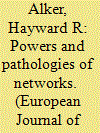|
|
|
Sort Order |
|
|
|
Items / Page
|
|
|
|
|
|
|
| Srl | Item |
| 1 |
ID:
107970


|
|
|
|
|
| Publication |
2011.
|
| Summary/Abstract |
The concept of networks has become synonymous with terrorism in recent years. Despite the abundance of material engaging the concept of terrorist networks, there is a paucity of research that applies analytic network methods to the empirical study of observed data. This article fills that void by comparing two arguments about terror network structure using a newly released attack network data set. One account suggests that terrorists purposefully structure their networks to maximize operational security (OPSEC) by minimizing connections, while an alternate proposition relies on findings in network sciences showing that many networks have a few well-connected individuals (referred to as scale-free structure). Empirical analysis of six evolving attack networks produces results contradicting both assertions. This article then looks beyond structure to examine whether there are any causal relationships between network characteristics and output, specifically attack casualties. The article concludes by examining possible drivers of network structure and pertinent policy implications.
|
|
|
|
|
|
|
|
|
|
|
|
|
|
|
|
| 2 |
ID:
166566


|
|
|
|
|
| Summary/Abstract |
Interdisciplinary energy research is essential. It advances our understanding of potential transitions from high to low carbon energy systems. However, it is easier to propose than deliver. It requires translation into a simpler language, to aid communication, but not at the expense of the conceptual language that drives our understanding of complex energy systems. We combine legal, political science, and policy studies to show how to balance the need to communicate accessibly and recognise legal and policymaking complexity. We begin with a statement so accepted in legal studies that it has become a truism: the law in the books is not the same as the law in action. The allocation of legal competences is only one influence on policymaking in a complex system. We describe three key ways to conceptualise this relationship between law, policy, and energy systems, focusing on the: (1) ‘on paper’ legal separation of powers between different governments, (2) interaction between law and policy in practice, including blurry boundaries between formal responsibility and informal influence, and (3) role of law as one of many contributors to policymaking. We use these approaches to explain the implications of Brexit for UK energy policy.
|
|
|
|
|
|
|
|
|
|
|
|
|
|
|
|
| 3 |
ID:
105953


|
|
|
|
|
| Publication |
2011.
|
| Summary/Abstract |
This article reconstructs Karl Deutsch's fearful yet hopeful views about the powers and
pathologies of military, and other, national and international network systems. These
views presuppose Norbert Wiener's Cybernetic Interpretive Hypothesis: that 'society
can only be understood through a study of the messages and communication facilities
which belong to it'; that the societal trend is towards more computerized communication
systems; and that they embody an 'open vs. closed' living systems ethos. Drawing on
science and technology studies by Edwards and Mirowski, the author suggests how
Deutsch's and Wiener's prophetic hopes, fears, and insights can also enrich and redefine
contemporary debates about the historical-technological development of our national
societies, the powers and pathologies of game-theoretically programmed computer
networks, the assessment of the life-preserving potential of our partly automated
security systems, the major threats from the continued poverty of the less developed
world, problems of decentralized governance, and the political, ethical, and religious
justifications for our national, international, and civilizational identities and purposes.
|
|
|
|
|
|
|
|
|
|
|
|
|
|
|
|
|
|
|
|
|